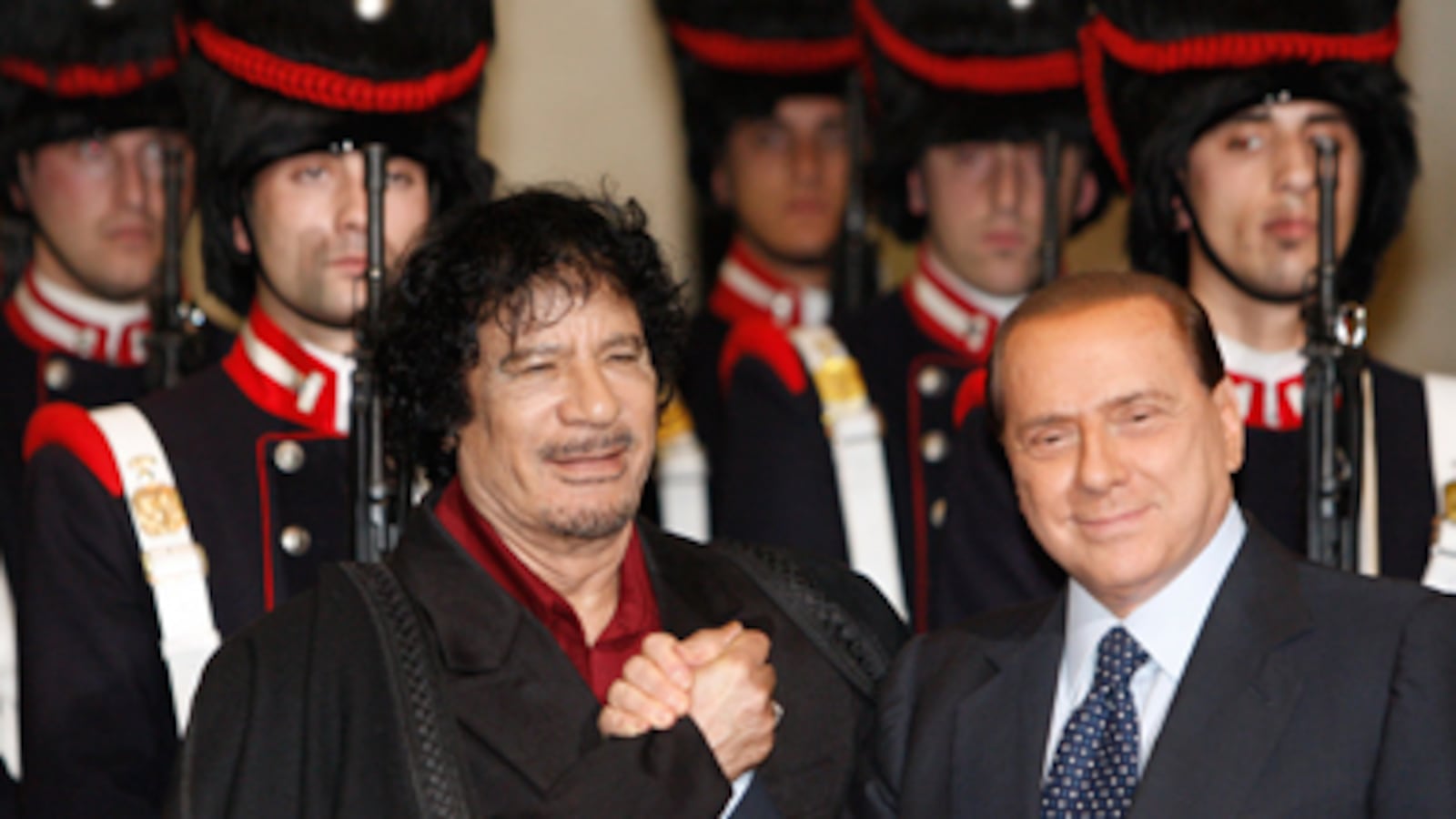If anyone can talk Muammar Gaddafi into slinking away from Libya, Italian Premier Silvio Berlusconi says it's him. The two troubled leaders are, after all, good friends.
"I can convince him to go into exile," Berlusconi said this week. He even offered to go to Tripoli to arrange the meeting himself, promising to negotiate what he calls an "honorable exit from the scene" for the man who has ruled Libya for 42 years. Berlusconi this week admitted that he felt bad about what's happening in Libya—and about what's happening to his friend, the dictator. "I'm saddened for Gaddafi and I'm sorry," he said at a campaign dinner in Turin this week. "What's happening in Libya hits me personally."

Until the bombs started falling, Berlusconi and Gaddafi were much more than casual acquaintances and bilateral buddies. The two shared an intimate friendship that was evident every time they met. When other world leaders graciously shook hands, Berlusconi and Gaddafi were like giddy schoolmates in each other's presence. In one meeting of the Arab League, Berlusconi even kissed Gaddafi's hand, an honor that in Italy is generally reserved for the pope. The two men share a penchant for sexed-up, orgiastic celebrations, and the all-female security detail that Gaddafi traveled with seemed straight out of the Berlusconi playbook.
Still, it may seem like a long shot that Berlusconi could now possibly reconcile with his former best friend. After all, deadly airstrikes that are slowly crippling Gaddafi's military are being launched from Italian soil. Italy has also fought hard to have the whole operation controlled out of the NATO base in Naples, in part so they have more of a say in how things go forward. Italian jets are flying missions, albeit by their own admittance they haven't actually bombed anything yet. Instead they are taking part in flyovers without actually pinpointing targets.
Italy had no choice but to grant use of the NATO bases—all seven of them—but it has been increasingly cagey about the country's full involvement. On Tuesday, Foreign Minister Franco Frattini described the implementation of the no-fly zone in Italy's eyes as "not a war mission, but a humanitarian one, to make Gaddafi fully respect the cease-fire." As one seasoned war correspondent put it, Italy's non-aggressive cooperation "is the military equivalent of not inhaling."
Berlusconi kissed Gaddafi's hand, an honor that in Italy is generally reserved for the pope.
This week Italy also threatened to take back control of the airfields now in use by the broad coalition if NATO is not soon given full charge of the mission. Italy is especially worried that without NATO, France will be left in charge—and subsequently win the lucrative rebuilding contracts that are a natural byproduct of war. France, like Italy, already has economic interests in Libya, especially in oil through the company Total, though not to the extent that Italy's ENI does. If NATO is in charge of the full operation, Italy can blame their NATO membership for their involvement, which could give the country a much better chance of keeping its business ties with Libya.
Transparency has never been one of Berlusconi's best traits, but most observers see through the façade of this 11th-hour diplomacy. If Gaddafi survives this war, Italy's distancing itself from the military offensive puts the country in a better position to resume business there as usual. If the rebels win—especially if Berlusconi is able to broker an exit for their fallen leader, or if Italy is seen to have participated militarily—the country also has a much better chance to cover its assets on the ground.
In the meantime, very few countries want to offer exile to a despot. Zimbabwe, Equatorial Guinea, Venezuela, and Nicaragua have been floated as possibilities. But Italians would likely be happier to grant Gaddafi the whole of the island of Lampedusa, now overrun with refugees from Libya and other troubled regions.
Barbie Latza Nadeau, author of the Beast Book Angel Face , about Amanda Knox, has reported from Italy for Newsweek Magazine since 1997 and for The Daily Beast since 2009. She is a frequent contributor to CNN Traveller, Departures, Discovery and Grazia. She appears regularly on CNN, BBC and NPR.






